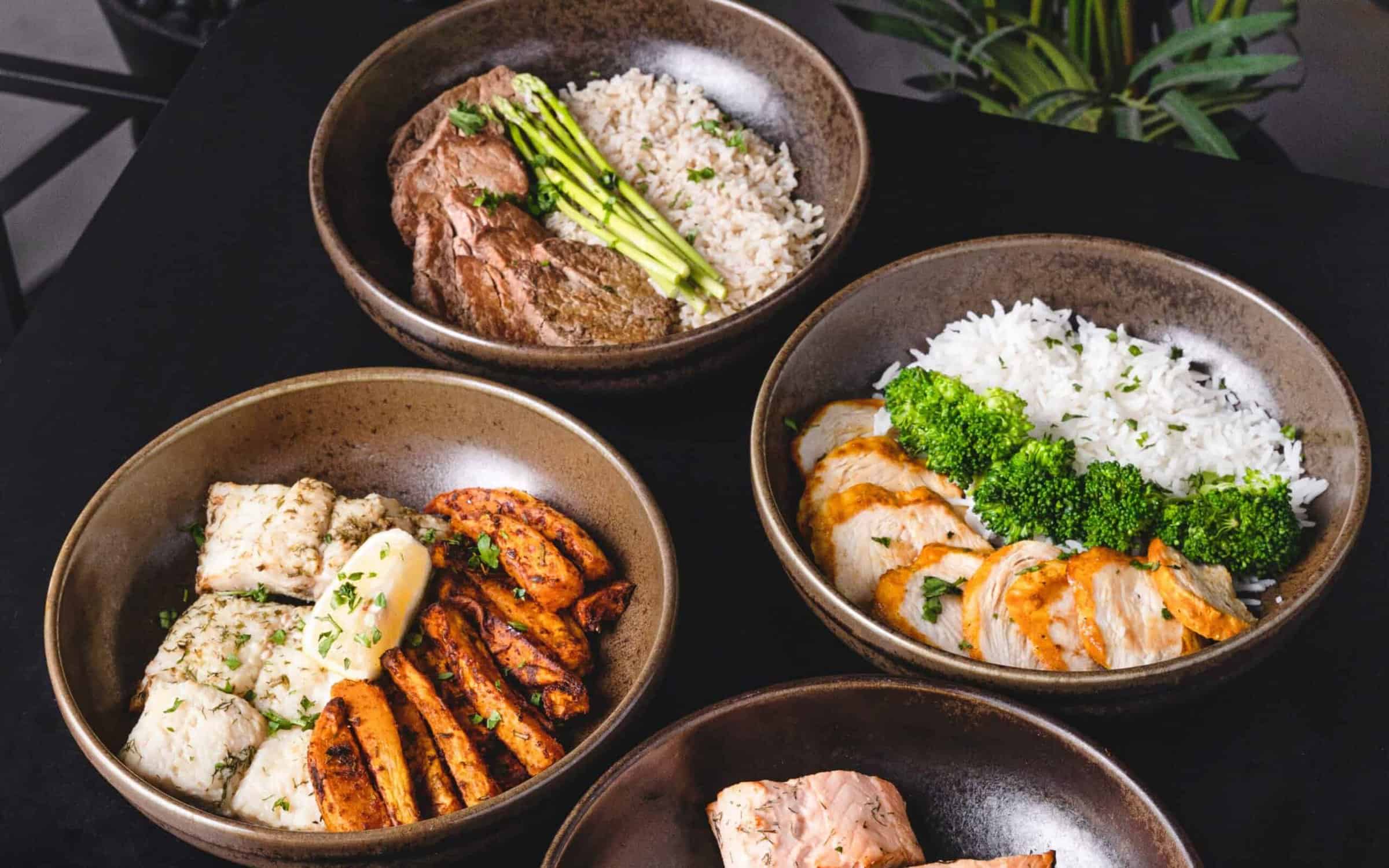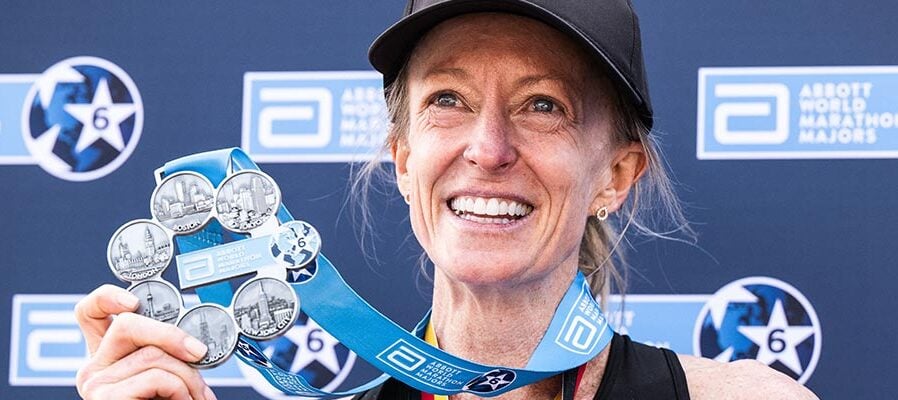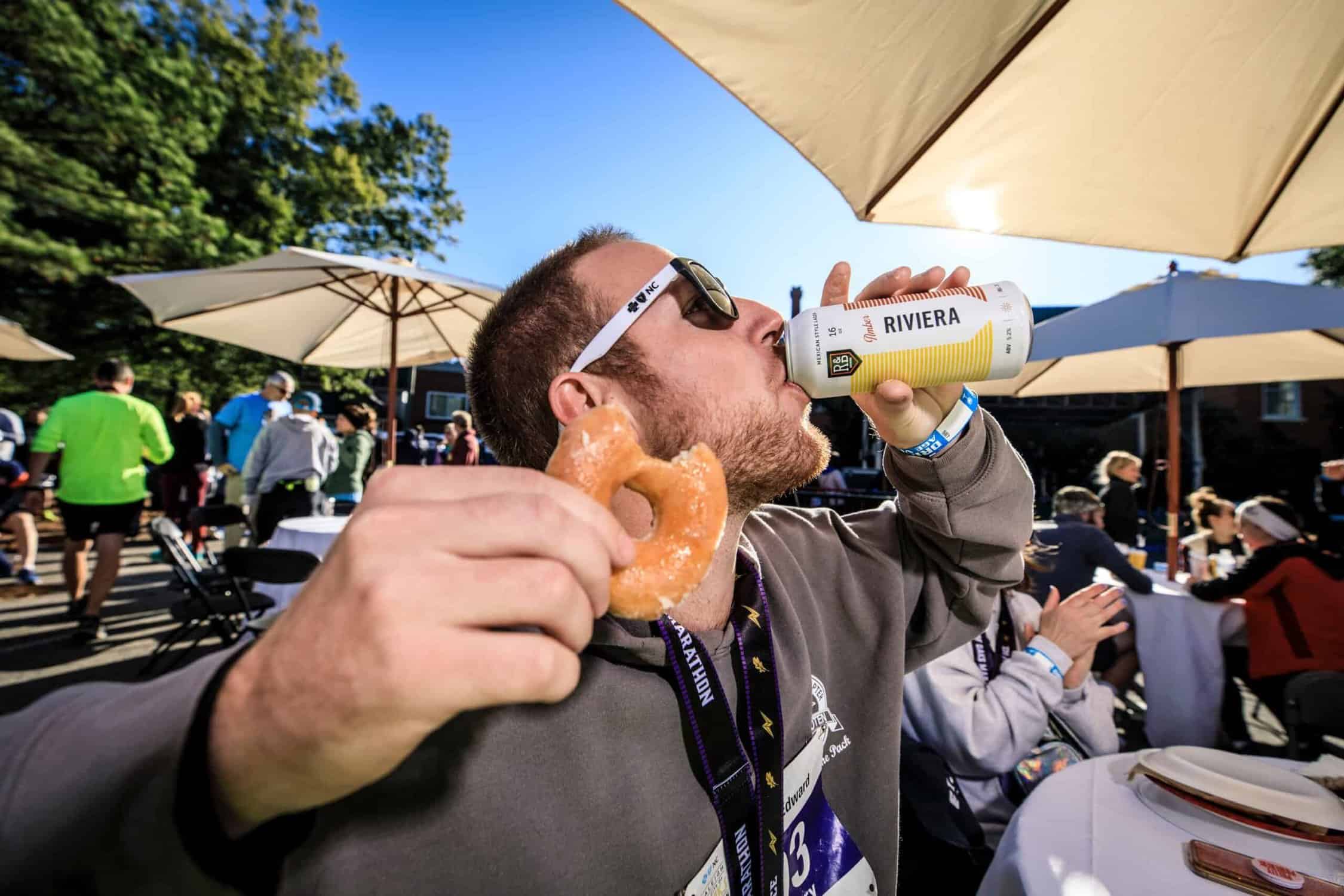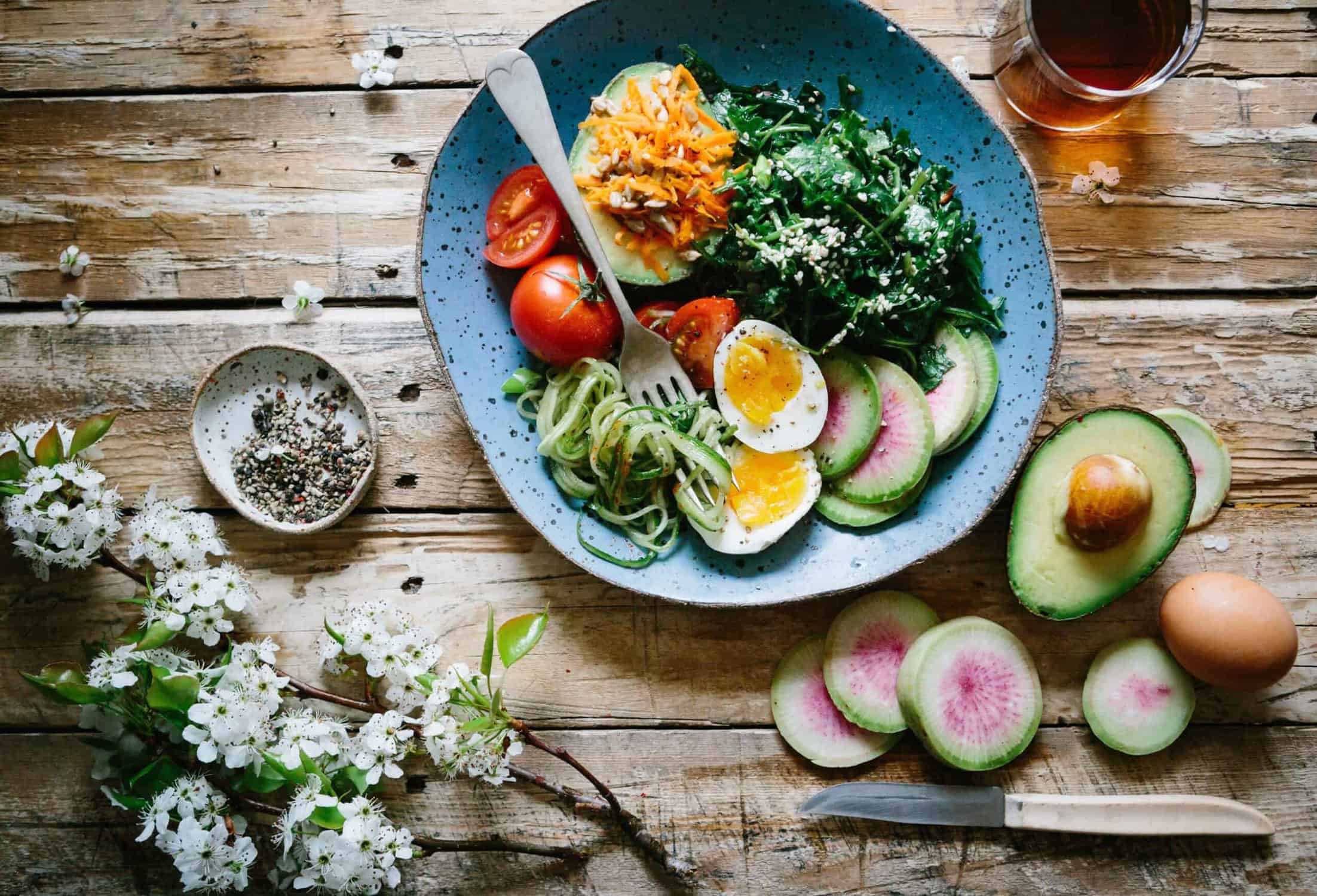I remember running my first half marathon in 2018. I paid absolutely no attention to carb loading, electrolytes, or pre-race meals for runners. I grabbed cup after cup from the race aid stations because I brought no snacks or supplements with me. Boy, did that one hurt.
I now know that I hit a wall because I hadn’t built up enough glycogen stores. I also didn’t consume any electrolytes during the race. It’s no wonder that I was a cramping mess!
Proper fueling makes a substantial difference. I can run faster, long distances, and am stronger during both my training and my races.
Nutrition is an essential component of maximizing running performance. By fueling with the right combination of carbohydrates, proteins, and healthy fats, athletes can improve training sessions, increase running endurance, and improve the time it takes muscles to recover.
In this article, I’ll dive into:
- What foods increase running stamina?
- What does a professional runner eat in a day?
- What foods should runners consume more of?
- What are some foods that runners avoid?
- What are recommended meals for runners to improve performance?
- What are suggested meals for runners to improve recovery?
- And more!
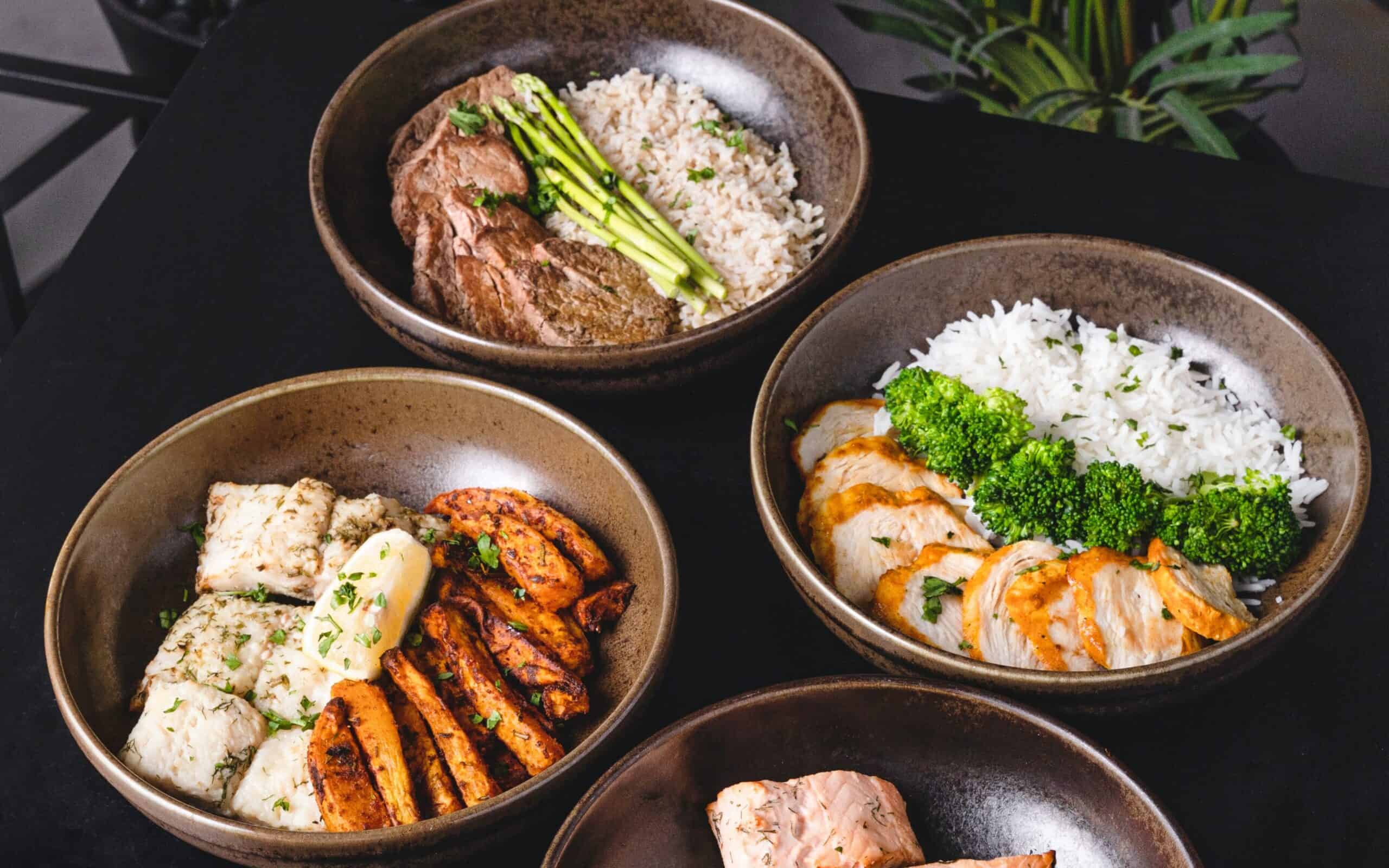
What’s the Best Food for Runners?
Carbohydrates
Carbohydrates are the primary source of energy for athletes of all kinds – runners are no exception.
During exercise, our bodies convert consumed carbohydrates into glucose. Glucose is used to produce ATP, the energy currency of our cells. Carbohydrates, if not being actively used by the body, are stored in our muscles and liver as glycogen, a readily accessible energy reserve. By focusing on the consumption of carbohydrates, runners ensure they have enough available energy reserves in, in glucose or muscle glycogen, to access during long bouts of sustained activity.
As a runner at any point in your training cycle, between 45% and 65% of your daily calorie intake should come from carbs as you plan your meals for runners. To figure out how many grams of carbohydrates you should be eating daily, start by calculating your daily calorie requirement.
The standard daily recommended calorie intake for men is around 2,500 calories per day, and for women is 2,000 calories per day. But, requirements will be different for all ages, activity levels, and metabolic rates.
Just as an example, let’s say you’re aiming for a diet of 2,500 calories per day. That means 1,125-1,625 of those calories should come from carbs.
On average, 1 gram of carbohydrates contains 4 calories. That means, if you’re aiming for that many calories, you’ll need to consume between 281g and 406g of carbohydrates per day.
Carbohydrate-dense foods are breads, pasta, whole grains, cereal, rice, fruits, starchy veggies, and beans.
Related: 14 Supplements for Runners
If you’re interested in weight loss, you’ll want to reduce the amount of calories gradually from your recommended daily caloric intake.
The Best Carbohydrate-Rich Foods for Runners
- Whole grains like oats, quinoa, brown rice all of which also provide a source of B vitamins.
- Simple carbs like potatoes, breads and low-sugar cereals.
- Fruits and vegetables like berries, bananas, leafy cruciferous vegetables which provide sources of potassium and vitamin C.
Protein
Protein plays the biggest role in muscle repair and recovery for athletes. In fact, marathon legend Eliud Kipchoge prioritizes healthy protein in his runner’s diet to repair torn tissues and recover from his training runs.
You’ll find Eliud eating red beans (43g of proteins per cup) and ugali (4g of protein per serving), a Kenyan cornmeal dish.
According to the Journal of the Academy of Nutrition and Dietetics, runners require 1.4 to 1.7 grams of protein per kg of body weight per day. The general recommendation of protein intake for non-athletes is 0.8 grams/kg.
Lean meats, fish, poultry, dairy products, beans, eggs, and tofu are rich sources of protein that aid in muscle maintenance and growth.
Protein-Rich Foods for Runners
- Lean proteins like chicken, turkey, fish, and eggs
- Legumes and beans like chickpeas, lentils and black beans
- Healthy fat sources like avocados, nuts, and seeds
- Low-fat dairy products like yogurt and milk which provide calcium for bone density as well
Fat
Healthy fats provide vitamins for nutrient absorption, an alternative energy source, and support overall health. They are the body’s second-line source of energy (after glycogen), they support brain function, and they help prevent cardiovascular disease.
Sources of healthy fats include avocados, nuts, seeds, fish, and olive oil. These contain essential fatty acids (like omega 3) and they help absorb important fat-soluble vitamins too.
What Are the Worst Foods for Runners?
To run at your best, avoid stomach issues, and improve your long-term health, there are some foods you should limit or remove from your diet entirely when thinking about meals for runners.
Limit processed sugar, grease, and anything heavily processed.
Some fruits are high in sugar, but are also high in fiber which reduces the impact it has on your blood sugar levels.
Foods runners should avoid as much as possible include:
- Processed foods like fast food, sugar-filled snacks, candy, soda, and sugary drinks. These all provide little nutritional value.
- Fried foods like french fries and deep-fried snacks. These are high in “unhealthy” saturated fats which are difficult to digest and contribute to heart disease. Greasy foods before a run may lead to gastrointestinal discomfort during a training session.
- Alcohol in excess can dehydrate you, disrupt your sleep patterns, and impair muscle repair.
What Do Professional Runners Eat in a Day?
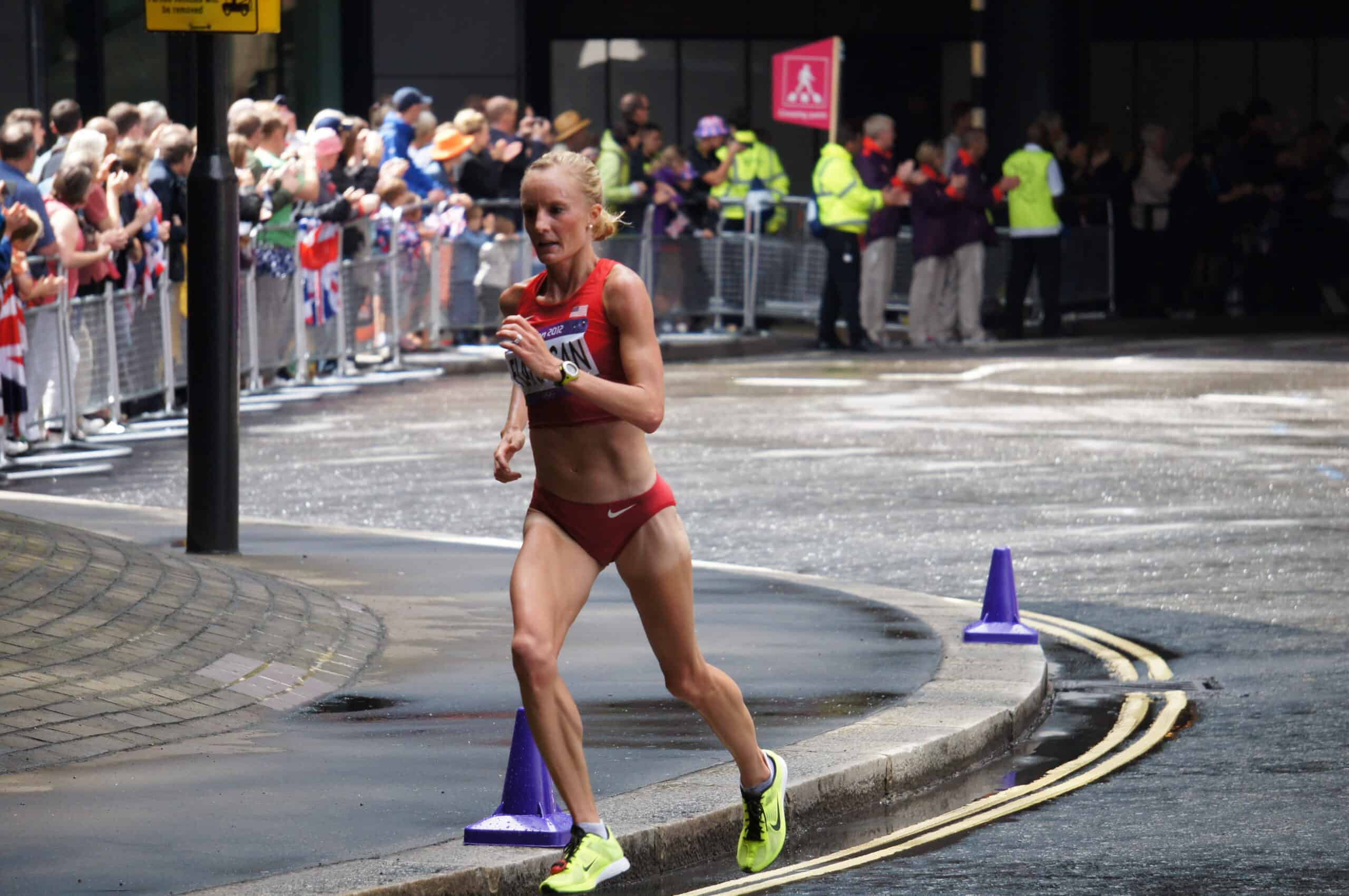
All runners are different and therefore, the meals for runners will be different.
Olympic marathoner and author of Run Fast. Eat Slow. Shalane Flanagan has previously shared her favorite recipes for runners and whole-foods approach.
Her recommendations? A hearty bowl of race day oats in the morning, post-workout smoothies, hearty grain salads, and homemade baked goods, with the occasional indulgence.
Marathon legend and Olympic gold medallist Eliud Kipchoge has also famously shared what his diet is like. He fuels himself with traditional Kenyan foods, beans, fruits, veggies, homemade breads, and tea. He has quoted bananas as being one of his favourite sources of fuel.
Natalie Cooks, chef and creator of Natalie Cooks Cooking Club, also has free recipes online created for Olympic athletes which is one of my favorite resources to share with clients.
The Best Snacks for Runners
The best runners’ snacks should simply consist of carbs + protein. Pairing carbohydrates with protein helps slow down the digestion and absorption of carbohydrates, resulting in a more sustained release of energy. This combination helps maintain steady blood sugar levels and provides a longer-lasting fuel source for athletes. Incorporate snacks into your overall meals for runners plan.
Here are some examples of my favorite balanced snacks:
1. Trail Mix Quinoa Energy Bites
2. Greek yogurt with berries and a drizzle of honey
3. Nut butter with apple slices or whole-grain crackers
4. Trail mix with a mix of nuts, seeds, and dried fruits
5. Hard-boiled eggs and half a bagel
6. Smoothies with fruit, spinach, Greek yogurt, and a scoop of protein powder.
Hydration for Runners
Proper hydration is essential for runners to maintain performance, support recovery, and prevent dehydration. The exact amount of hydration you need varies on body weight, exercise intensity, duration, climate, and individual sweat rate.
However, here are some guidelines to get you started:
Before Running
Start any exercise in a well-hydrated state. Drink 16 to 20 ounces (500 to 700 milliliters) of water or a sports drink 2 to 3 hours before your run or on race day. If you’re not able to drink that much in advance, drink smaller amounts in the hour leading up to your activity.
During a Run
During exercise you should drink fluids to replace the water and electrolytes lost through sweat. The American College of Sports Medicine suggests consuming about 7 to 10 ounces (200 to 300 milliliters) of fluid every 10 to 20 minutes during exercise.
This can come from water, sports drinks, or a combination.
If you prefer sports drinks, choose ones that provide electrolytes and carbohydrates (like Gatorade, LMNT, or Skratch Labs) to help maintain hydration and provide energy.
Post-Run
Aim to drink at least 16 to 24 ounces (470 to 700 milliliters) of fluid for every pound (0.45 kilograms) lost during exercise. Weigh yourself before and after your run to estimate fluid losses to gain an understanding of how much fluid you need.
Avoid chugging plain water immediately after a run as this will cause your blood sodium levels to drop, causing exercise-associated hyponatremia (EAH).
Do Runners Need to Replenish Electrolytes?
For runs longer than 90 minutes, replenishing electrolytes becomes very important. Electrolytes such as sodium, potassium, and magnesium help maintain fluid balance and aid in muscle function. Sports drinks, electrolyte tablets, and energy gels are helpful during endurance exercise. Read our blog post dedicated to electrolytes for runners here.
What Are Healthy Recipes for Meals for Runners?
One of the most common questions I get as a dietitian is “what is a good meal for a runner?”. Here are some easy, quick, and healthy recipe ideas for breakfast, lunch, and dinner that make perfect meals for runners:
Breakfast Ideas for Runners:
- Overnight oats: Combine rolled oats, milk, chia seeds, and your choice of toppings such as berries, nuts, cocoa powder, and a drizzle of honey. Let it sit overnight in the fridge, and in the morning, you’ll have an energizing breakfast ready to go.
- Veggie egg cups: Whisk together eggs, chopped vegetables (spinach, bell peppers, onions, etc.), and a sprinkle of cheese. Pour the mixture into muffin cups and bake until set.
- Beet and blueberry superhero muffins (from the book ‘Run Fast. Eat Slow.’): Prepare these muffins and have them ready to go for your busy mornings.
- Whole grain toast with avocado and eggs: Toast two slices of whole grain bread and top them with mashed avocado and a poached or scrambled egg.
- Overnight chia pudding: Mix chia seeds with your choice of milk and a touch of sweetener. Let it sit overnight in the fridge, and in the morning, top it with fresh berries, sliced almonds, and a drizzle of honey or maple syrup.
- Protein pancakes: Blend together oats, banana, eggs, and a scoop of protein powder if you have any. Cook the batter on a non-stick pan and serve with a dollop of Greek yogurt and berries for antioxidants.
Lunch Ideas for Runners:
- Quinoa salad with grilled chicken: Cook quinoa and let it cool. Toss with grilled chicken breast, mixed greens, cherry tomatoes, cucumber, and a light vinaigrette dressing (you can buy this ready-made for convenience). Add some sliced almonds or feta cheese for extra flavor.
- Mediterranean wrap: Fill a whole-wheat tortilla or pita with grilled chicken or falafel, hummus, diced tomatoes, cucumbers, olives, and a sprinkle of feta cheese.
- Lentil and vegetable soup: In a pot, sauté onions, carrots, celery, and garlic. Add cooked lentils (red lentils are the easiest), low sodium vegetable broth, diced tomatoes, and your choice of spices. Let it simmer for 15-30 minutes.
- Roasted vegetable salad: Cook quinoa or couscous and toss it with roasted vegetables (such as sweet potatoes, zucchini, and cherry tomatoes), fresh herbs, lemon juice, and a drizzle of olive oil. Add some feta cheese or chickpeas for an added protein source.
- Pizza Cali (from the book ‘Run Fast. Eat Slow.’): Complete with pesto, veggies, cheese, and fresh lemon zest, this pizza is to die for and makes for an easy lunch to bring to work.
- Chickpea and avocado wrap: Mash chickpeas with avocado, lemon juice, and spices to make a delicious spread. Fill a whole wheat wrap with the mixture, along with sliced cucumbers, shredded carrots, and greens.
Dinner Ideas for Runners:
- Baked salmon with quinoa and roasted vegetables: Season salmon fillets with herbs, lemon juice, and a drizzle of olive oil. Bake in the oven until cooked through. Serve it with cooked quinoa and a side of roasted vegetables like broccoli, carrots, and brussel sprouts.
- Whole wheat pasta with lean protein: Cook whole-wheat pasta and toss it with grilled chicken, sausage, or textured vegetable protein (TVP), sautéed spinach, cherry tomatoes, garlic, and olive oil. Top with parmesan cheese and fresh basil for extra flavor.
- Stir-fried tofu with brown rice and mixed veggies: Sauté tofu cubes with mixed vegetables (such as bell peppers, snap peas, and broccoli) in a stir-fry sauce of your choice (makes this meal super convenient!). Serve it over cooked brown rice for a nutritious and plant-based dinner option.
- Baked cod with quinoa and steamed broccoli: Season cod fillets with lemon juice, garlic, and herbs. Bake in the oven until cooked through. Serve it with toasted French bread and steamed broccoli for a nutritious dinner.
- Greek beef or chicken kebabs with tzatziki and pita: Bathe chicken or beef cubes in a spiced yogurt marinade and skewer them up with veggies.
- Lentil curry: Cook red or green lentils with a mix of spices, onions, garlic, and diced tomatoes. Serve the lentil curry over brown rice and enjoy a hearty and flavorful dinner.
Sample Meal Plan for Runners
Eating healthy doesn’t need to consume your life. Here is an example two-day meal plan for runners. This plan provides a balance of carbohydrates, proteins, and healthy fats to fuel your marathon training and support optimal performance.
Adjust portion sizes based on your individual needs and preferences and consult with a sports nutrition professional or nutritionist for personalized advice.
Sample 1: Day of Meals for Runners
Breakfast: Can’t Beet Me Smoothie (from the book ‘Run Fast. Eat Slow.’)
Snack: Apple slices with peanut butter
Lunch: Quinoa salad with grilled chicken (mixed greens, cooked quinoa, grilled chicken breast, cherry tomatoes, cucumbers, feta cheese, and a vinaigrette dressing)
Snack: Greek yogurt with a drizzle of honey and a handful of mixed nuts
Dinner: Creamy lentil tomato soup with parmesan toast (from Natalie Cooks)
Evening snack:Buckwheat banana bread (from Natalie Cooks)
Sample 2: Day of Meals for Runners
Breakfast: Sweet potato breakfast cookies (from the book ‘Run Fast. Eat Slow.’)
Snack: Banana with a tablespoon of almond butter
Lunch: Soba noodle salad with peanut sauce (from the book ‘Run Fast. Eat Slow.’)
Snack: Trail mix with a mix of nuts, seeds, and dried fruits
Dinner: Lentil curry with brown rice (red or green lentil curry cooked with onions, garlic, diced tomatoes, and spices with brown rice and steamed broccoli)
Evening snack: Greek yogurt with sliced peaches and a sprinkle of granola
FAQ
The best food for runners is a balanced, nutrient-rich, and whole foods diet that provides the necessary energy, nutrients, and hydration to support your training plans.
Bananas are a good source of natural sugars, potassium, and carbohydrates to support your running. Beetroot juice is also known for its high nitrate content, which can improve endurance and exercise performance.
A runner should eat three meals per day and have at least two snacks.
A runner should eat three meals per day and have at least two snacks.
Runners should limit their intake of processed foods, greasy foods, and alcohol.
You should consume a well-balanced meal or snack that includes carbohydrates, protein, and healthy fats within 30 minutes to 2 hours after exercise. This promotes muscle recovery, glycogen replenishment, and immune function.
The best foods to eat before running are low in fiber and fat to promote rapid digestion. You should eat a snack or meal 1-3 hours before running.

